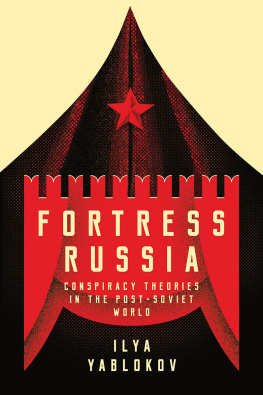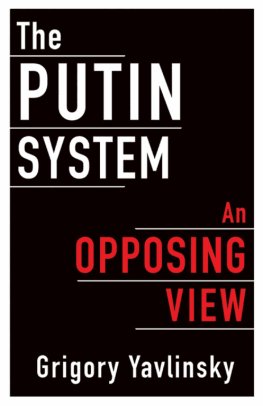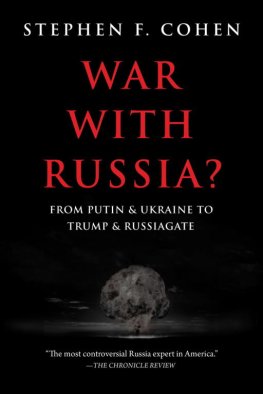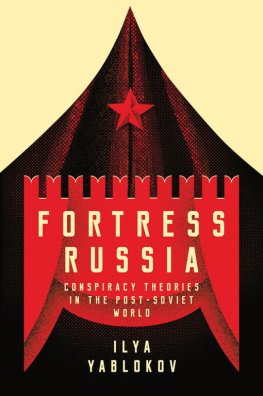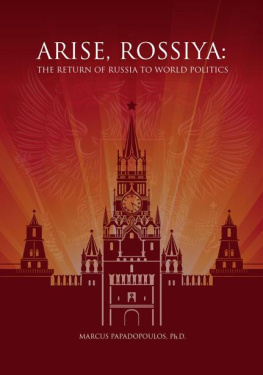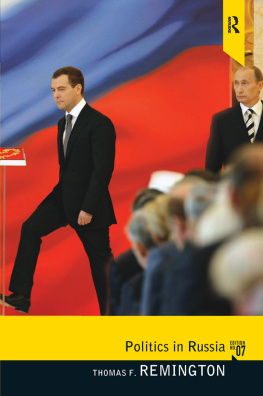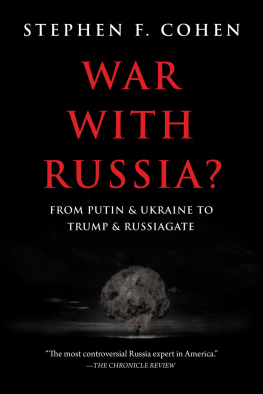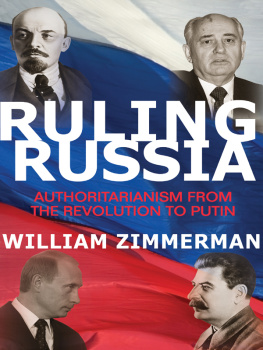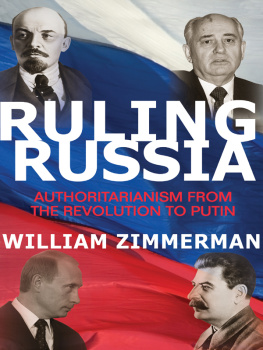Contents
Guide
Pages

To my parents, Olga and Aleksandr
Fortress Russia
Conspiracy Theories in Post-Soviet Russia
Ilya Yablokov
polity
Copyright Ilya Yablokov 2018
The right of Ilya Yablokov to be identified as Author of this Work has been asserted in accordance with the UK Copyright, Designs and Patents Act 1988.
First published in 2018 by Polity Press
Polity Press
65 Bridge Street
Cambridge CB2 1UR, UK
Polity Press
101 Station Landing
Suite 300
Medford, MA 02155, USA
All rights reserved. Except for the quotation of short passages for the purpose of criticism and review, no part of this publication may be reproduced, stored in a retrieval system or transmitted, in any form or by any means, electronic, mechanical, photocopying, recording or otherwise, without the prior permission of the publisher.
Library of Congress Cataloging-in-Publication Data
Names: Yablokov, Ilya, author.
Title: Fortress Russia : conspiracy theories in post-Soviet Russia / Ilya Yablokov.
Description: 1 | Cambridge, UK ; Medford, MA : Polity, 2018. | Includes bibliographical references and index.
Identifiers: LCCN 2017055177 (print) | LCCN 2018009984 (ebook) | ISBN 9781509522699 (Epub) | ISBN 9781509522651 (hardback) | ISBN 9781509522668 (paperback)
Subjects: LCSH: Russia (Federation)--Politics and government--1991- | Conspiracy theories--Russia (Federation) | Political culture--Russia (Federation) | Authoritarianism--Russia (Federation) | Intellectuals--Political activity--Russia (Federation) | Russia (Federation)--Foreign relations--Western countries. | Western countries--Foreign relations--Russia (Federation) | BISAC: SOCIAL SCIENCE / Sociology / General.
Classification: LCC DK510.763 (ebook) | LCC DK510.763 .Y33 2018 (print) | DDC 001.90947--dc23
LC record available at https://lccn.loc.gov/2017055177
ISBN-13: 978-1-5095-2269-9
A catalogue record for this book is available from the British Library.
The publisher has used its best endeavours to ensure that the URLs for external websites referred to in this book are correct and active at the time of going to press. However, the publisher has no responsibility for the websites and can make no guarantee that a site will remain live or that the content is or will remain appropriate.
Every effort has been made to trace all copyright holders, but if any have been inadvertently overlooked the publisher will be pleased to include any necessary credits in any subsequent reprint or edition.
For further information on Polity, visit our website: politybooks.com
Acknowledgements
From the moment that the idea of this book was conceived to the day the final version of the manuscript was sent to my editors, eleven years have passed. Throughout this long and eventful period there were many people who helped me design the arguments, change my views, dig deeper and think more critically. Firstly, this project would never have been realized without the advice of Viktor Muchnik, my mentor and academic guru at Tomsk State University. His suggestion of looking more closely at conspiracy theories, made over a cup of coffee, turned out to be decisive and laid the groundwork for past and future achievements. Rashid Kaplanov, Viktoria Mochalova, Semion Goldin and all of the staff at Sefer, the Moscow centre for Jewish studies, were the first to support me financially and helped me begin collecting the resources for this project. Daniel Romanovsky and Viktor Shnirelman gave advice for my first academic steps. Oleg Khazanov at Tomsk State University, Michael Miller at Central European University, Michael Tuval at the Hebrew University of Jerusalem and Rani Jaeger in Stockholm showed me how academic research could actually be fun. Gevorg Avetikyan, Istvan Pal Adam, Sanja Tepavcevic, David Karas, Anastas Vangeli, Vadim Nigmatov and Yulia Likhacheva-Kuzmane were always there (mainly in Budapest) to run by me many ideas that later appeared in the book.
The key person who made the production of this book possible is Vera Tolz, who had faith in this project from the very first day we met. Veras knowledge and academic achievements, as well as her critical and thorough analysis of texts, have provided me with academic inspiration and a scholarly role model. Her kindness and willingness to help in every possible situation greatly contributed to the successful completion of this book. She taught me how to be a teacher and mentor, which I shall always remember. I am indebted to Peter Knight for his extraordinary help in developing the conceptual framework required to approach such a peculiar topic. As a student in Tomsk, Peters book on American conspiracy culture was the first that I read on the subject and indeed it was sheer luck and, of course, an absolute privilege to have him as second supervisor of my project. As a young scholar, I am also indebted to Stephen Hutchings for providing invaluable academic opportunities. Stephens critical comments, a deep understanding of Russian culture and readiness to share knowledge helped me look at my project in a different way and has laid the foundations for future research. Lynne Attwood was extremely helpful during the work on my project in Manchester and, at a later stage, was a key figure in turning my often unbearably academic language into a (hopefully) fascinating read. Luke Marchs opinion on the PhD dissertation and the further evolution of the text have been crucial in turning what was a postgraduate thesis into a proper book.
A friendly and creative atmosphere at the School of Arts, Languages and Cultures at Manchester also contributed to the outcome of the book. Elizaveta Alentaeva, Elena Simms, Paul Richardson, Svetlana Rapin, Kenzie Burchell, Alistair Dickins, Jan Gryta, Piotrek Andrzejewski, Marina Henrikson and Ana Barazal Barreira were at every moment very supportive of my work on the book, both in the office space and at our house in Victoria Park. Of all people in Manchester I am especially indebted to Alistair, who was very kind in sharpening my skills as an entry-level writer. Manchester was also the place where I met my co-author and close friend Elisabeth Schimpfossl. Since then we have shared the happiness and sadness of our first steps in the field while working in parallel on our first books and numerous fascinating projects about Russian media. I am very lucky to have a colleague and friend from whom I learn every day.
The final part of the book has been written in Leeds where my colleagues/friends, James Harris, Natasha Bogoslavskaya, James Wilson, Pavel Gudoshnikov and Robert Hornsby, have done everything within their powers to ease the teaching workload, inspire me with new ideas and challenge me at every turn.
The young generation of scholars in Russian studies has not only provided me with feedback and useful criticism of my ideas, but also has become a source of inspiration and support in all the possible circumstances that face the young academic in Britain. Arsenii Khitrov, Olga Zeveleva, Tom Rowley, Nathan Brand, Vsevolod Samokhvalov, Jon Roosenbeek these words are dedicated to you.
I should like to thank my colleagues and friends around the world Vasily Gatov, Alexey Kovalev, Alexander Etkind, Peter Pomerantsev, Viktor Vakhshtayn, Marlene Laruelle, Mark Bassin, Samuel Greene, Gulnaz Sharafutdinova, Peter Rutland, Steve Norris, Alexey Miller, Peter Duncan, Andrew McKenzie-McHarg, Sergei Samoilenko, Eliot Borenstein, Joe Uscinski, Mark Fenster, Tigran Amiryan, Samuel Volfson, Anastasiya Stepanyants, Irina Baulina and Andrey Goryanov. Their words of advice have been extremely well received during the work on the book and helped me navigate through the murky waters of Russian politics, which is full of conspiracies real and imagined.

